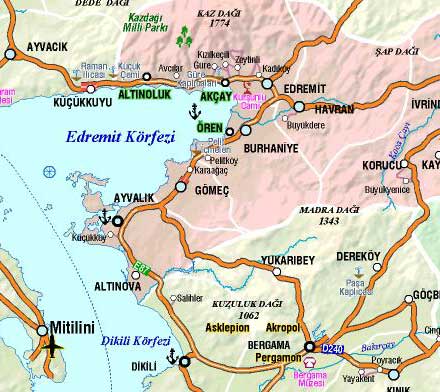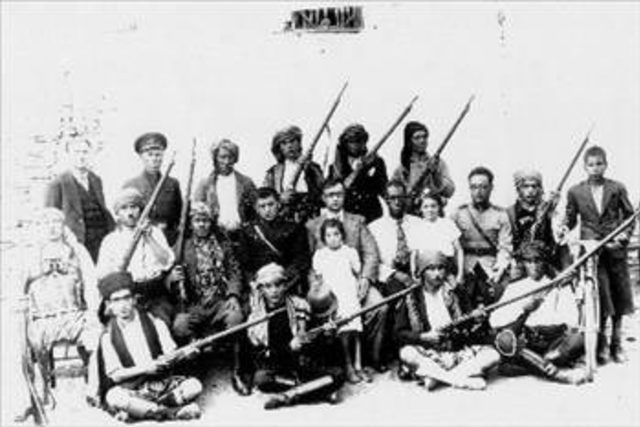according to both his friends and the Greeks, the ringleader
of the anti-occupation movement in Edremit. His 10-page
report (other POW reports were 2-3 pages, at most) is a
very well-written and passionate denunciation of the
Greeks and the occupation.

Here is a brief biography of Muzaffer bey (the surname
Akpınar was adopted in 1935):
Muzaffer Akpınar (Rhodes 1891–Edremit 1955), a
graduate of 1913, and was one of the most active
pharmacists in the history of Edremit.
During World War I he was Health Officer for the
Control of Infectious Diseases in Damascus and Antioch,
and pharmacist of the Nablus (Palestine) Surgical Hospital.
He volunteered for the National Army (Kuva-yı Milliye),
and organized the Committee for the Defense of the Rights
of Anatolia and Rumelia in the struggle for liberation, for
which he was decorated with the red-ribbon Turkish
Independence Medal. M. Akpınar founded the Edremit
Idman Yurdu sports club, and served as Member of
Parliament for Balıkesir for four terms.//

The memories of captivity of a pharmacist from Edremit:
and torture inflicted without exception on men, women and
children
during the Greek occupation.
The pages of history will be blackend by
the vicious atrocities that are
unique to the Greeks.
How the Greeks İmplemented
Torture:
Included among the types of brutality that the Greeks saw
fit to use
were burning people in fire, impaling children with stakes, having
women and children get bloody by running through an area of grain
sprinked with
thorns, subjecting poor villagers to death by herding
them through a gauntlet
of bats, rifle butts, boot and spur kicks at the
brutal whim of an officer or a
sergeant or even just a soldier.
Any matter – no matter how insignificant – would be punished by
hanging someone by
his feet and beating him until he vomited blood,
pouring hot olive oil on one’s
stomach, nailing needles between flesh
and fingernail, pulling out fingernails,
pressing a red-hot bar or other
metal part to various parts of one’s body,
putting boiling hot eggs
under one’s armpits – these were the main duties that
kept the Greeks
busy at the military occupation offices and the Gendarmerie
outposts.
Even a villager from the most
remote place witnessed the
implementation of this policy of destruction the
Greeks inflicted in
Anatolia.
In the event that a complaint was filed in their offices and
facilities
about the crimes the Greeks committed they would say “if a soldier
did it we won’t interfere. We can’t tell
them what to do.” If a
complaint was
filed at a Greek military facility the response would be
“who taught you such slander
and who incited you this way?” and
the
complainant would be subjected to one of the collection of
tortures I
enumerated above.
Again, whether the punishment was severe or light would
depend on
the whim of the concerned officer or sergeant. Every young person
waited each day for a
calamity to befall him. Anyone the
Greeks saw
as being sturdy and free were beaten down by the vile initiatives of
their despicable administrations. Or
if they determined that the youth
was no longer a threat, they would simply
crush and kill him. If
personal threats
did not bear fruit, then measures would be taken
against even the youngest of
one’s family. For days on end their
lives
would be made miserable in the occupation offices and the
Gendarmerie
outposts. Force and pressure would be
applied with no
let up. People would be
banished, homes destroyed. In short,the
Greeks would do anything and everything.
Youths Were the Greeks' Greatest Enemy:
“You will not name your newborn children after any Turkish heroes.”
So after they saw that a
number of children had been named Mustafa
Kemâl they arrested the families on
one pretext or another. As they
explained the arrests with fabrications and lies, they made know their
dislike
for the name Mustafa Kemâl and shamelessly proposed that the
child’s name be
changed.
Having money and being rich constituted a serious
fault. Every day
the Greek Gendarmerie
and military would visit markets, factories,
shops and any other kind of
commercial place to see what they could
get.
They had themselves invited in and talked about their need for
clothes
and boots. These dogs, who were used to
frequenting the cafés
in an apron and sandals to work as waiters, would make
the merchants
outfit them in pants made of English fabric, the most elegant
suits and
boots polished with varnish.
In order to take care of any other needs, they would hit up
another rich
person the next day. So no
one would let on about having money,
wouldn’t wear anything chic or nice and
avoid riding a valuable animal.
In fact,
people were careful to not even carry a set of beads or a nice
cigarette
holder. Otherwise they would fall victim
to the preying touch
of those voracious, insensitive hands. Nothing could be said about it.
The martial law command decreed that no one could be on the
street
after 10 o’clock, European time. But
those who come out of the mosque
after prayers before 8 were stopped and beaten
in basements for a few
days. The
situation came to the point where you would be taking your
life in your hands
to go visit a neighbor at night. The
biggest pretext the
Greeks had for entering and violating the sanctity of the
home was to
search for weapons.
In short, the word “Greek” carries with it the meaning of
the most blood-
thirsty, violent, vilest actions ever witnessed by mankind that
resulted in
stripping, robbing, beating, striking, killing and the breaking
arms and
legs.
//END of PART XXVIII-A//

Hiç yorum yok:
Yorum Gönder